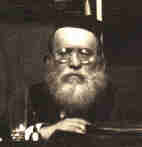 |
Hadrash Ve-haiyun
|
 |
Hadrash Ve-haiyun
|
5761
Chayei Sara
To Dedicate Please Contact Hadrash Ve-Haiyun
And Avraham was old, well on in his days and Hashem blessed Avraham with everything. (Bereishis 24:1)
With this posuk the Torah introduces us to the parsha of shidduchim i.e., matchmaking. Commenting on the concluding words of this posuk, Rashi notes that the numerical value of the word “bakol,” i.e., all, is equivalent to “ben,” i.e. son. The implied message is that because Avraham was blessed with a son it was necessary for him to marry him off. With this short introduction the episode begins. We may note that Rashi only addresses the second half of the posuk but does not comment on the first half. We may thus ask, what is the significance of the first half of the posuk? More specifically, why did the Torah introduce the Parsha of shidduchim by stating that “Avraham was old and well on in his days?”
Before we attempt to answer this question, let us try to imagine what we would have expected of Avraham had the Torah not recorded the minute details of Yitzchak’s shidduch. We must understand that Yitzchak was a precious child that was born to Avraham in his old age. He was a holy child that was offered as a human sacrifice and was only miraculously spared. He was the child that Hashem promised Avraham would be the progenitor of a great nation that would guide the world towards its destiny. In Yitzchak lay the destiny and purpose of the Jewish people, the world, and Creation. With this picture in mind, we would assume that Avraham would have taken a very active, hands-on approach to the matter to make sure that his son would marry the girl that was destined for him.
Yet, to our surprise the Torah records how Avraham entrusted his slave Eliezer with the mission. If this was not strange enough, let us also note that Eliezer was biased. He himself had a daughter whom he felt was appropriate for Yitzchak. In addition, it is not correct to suggest that Avraham was too old and frail to be involved. After all, we do find that after Yitzchak’s marriage, Avraham himself remarried and had more children. If Avraham had the strength and ability to remarry and start a new family then certainly he must have had the ability to be involved in Yitzchak’s shidduch.
In an attempt to grasp an understanding of Avraham’s behavior, we would perhaps be forced to suggest that Hashem put this plan into his mind in the form of prophecy; otherwise, G-d forbid, we would be forced to suggest that Avraham was momentarily seized by a fit of foolishness.
However, let us propose that it is precisely this difficulty that the obscure introduction comes to address. The parsha begins with the words “and Avraham was zokain.” The word zokain is commonly translated as old. However, throughout chazal this word is also interpreted as meaning wise. The explanation for this is that the word zokain is an acronym for “zeh shekana chachma,” i.e., this one, who has acquired wisdom. Let us note that there are two types of wisdom. The first type is keen intellect. The second type is the wisdom that comes with age, or in other words, the wisdom of life experience. Many times the latter form of wisdom proves to be far more reaching and profound then the former. The posuk states two things; first, “Avraham was wise” and second “he was well into his years.” We may now interpret this as meaning that for Avraham, in addition to possessing an exceptional intellect, Avraham also possessed the wisdom of his days, that being, the wisdom of life experience. To summarize, Avraham possessed the totality of wisdom.
Considering this we can now understand the message of the introduction. The posuk introduces the parsha of Shidduchim by informing us that although to the simple observer the behavior of Avraham seems foolish, bizarre and irresponsible, the Torah immediately sets the record straight by testifying that Avraham approached this matter with the perfect wisdom and sagacity. With his exalted spiritual understanding of Hashem, he realized that shidduchim are governed by an entirely unique type of Divine providence. He knew clearly that the only one who could properly direct the match of his son was none other then Hashem alone. He decided to “let the chips fall where they may” in a manner where he would be totally removed. Indeed, at the conclusion of the match, even Lavan declared, “Hashem has brought this matter to be and we can not protest, neither bad or good.”
There is a very powerful message in the words of the posuk’s introduction. We are certainly not on the exalted level of Avraham where we may sit back and let things happen by themselves. On the contrary, we are required by halacha to be personally involved to the best of our ability to direct things in a manner that seems proper and fitting with regard to all shiduchim that fall within the domain of our responsibility. However, at the very least we should keep in mind the attitude and mindset of our wise Patriarch, who with his all-encompassing wisdom approached this matter knowing good and well that it is Hashem who makes Shidduchim!